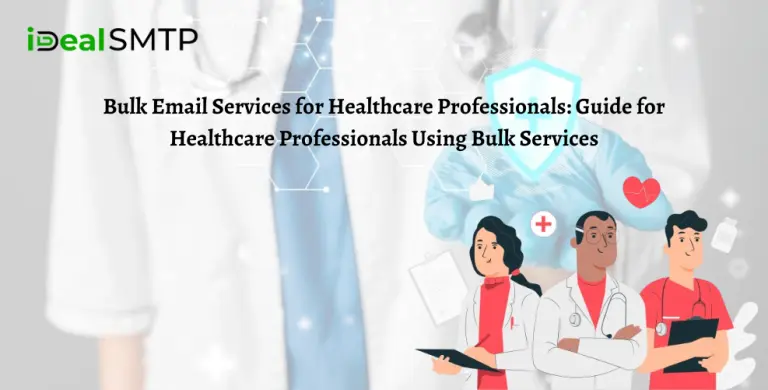Health providers, including doctors, nurses, and administrative workers, always find themselves having to convey information to patients, colleagues, and other parties in a way that is understood. This is where the potential of bulk email services for healthcare industry comes out in bright, thereby giving a well-organized strategy to improve communication in healthcare organizations. Bulk email services that health professionals use are the instruments which can send a lot of the emails with one click. They help greatly when the doctors intend to distribute, update or remind the whole audience all the critical health information. This Bulk email method for Healthcare Professionals represents an evolutionary jump in communication, which allows multi-recipient emails to be sent with just a few clicks.

Table of Contents
Key Features and Benefits of Bulk Email Services for Healthcare Professionals
Time Efficiency:
Bulk email services for Healthcare Professionals offer significant time savings. To the patients’ service, practitioners can use mass emails for the appointment reminders, checkups, or for general health suggestions; this will eliminate the single human effort. In doing so, the system speeds up medical procedures so that practitioners can take care of the patient while spending less time on administrative tasks.
Customization and Personalization:
Contrary to the common misconception that Bulk email services for Clinics are generic, modern bulk email services offer customization options. Healthcare providers can personalize messages by greeting patients by name, providing necessary medical information, and adapting material to certain groups. This personalized touch improves the connection between medical professionals and their patients.
Cost-Effectiveness:
In traditional methods of communication people typically use postal mail or phone calls which can be quite costly and time-consuming. Healthcare bulk email services dramatically reduce these costs overall and let communication with healthcare facilities be affordable even to the smallest practices with deficit budgets. Such cost-saving capabilities allow healthcare entities to efficiently plan and allocate their resources.
Appointment Reminders and Follow-Ups:
Missed appointments are a common challenge in healthcare. Bulk Email Service Provider excels in sending automated appointment reminders and follow-ups, helping reduce no-shows. This not only improves the overall efficiency of the healthcare system but also enhances patient engagement and satisfaction.
HIPAA Compliance:
Healthcare providers must be familiar with the main privacy regulations stipulated in HIPAA. For readiness with healthcare requirements, most healthcare platforms have been made with data privacy norms in mind, ensuring the data safety of patients’ personal information. Encryption in a professional language using HIPAA-compliant bulk email is a crucial issue for the physicians involved.
Choosing the Right Bulk Email Service for Healthcare Professionals
Selecting the appropriate Bulk email service providers for Healthcare institutes is crucial for maximizing the benefits outlined above. Consider the following factors when choosing a service:
Security Measures:
Prioritize Bulk email services for Healthcare Professionals that adhere to stringent security standards, especially if dealing with sensitive patient information. Look for features such as encrypted communication and secure storage.
User-Friendly Interface:
Opt for a service with an intuitive and user-friendly interface. This is particularly important for healthcare professionals who may not have extensive technical expertise.
Customization Options:
Ensure that the chosen Bulk email services for Healthcare Professionals allow for the customization of emails. The ability to personalize content and tailor messages to specific patient groups is essential for effective communication.
Automation Capabilities:
Look for automation features, such as scheduled email delivery and automatic follow-ups. These functionalities can save time and ensure timely communication with patients.
Compliance with Regulations:
Verify that the Email Marketing Services for Healthcare Professionals comply with relevant healthcare regulations, especially if dealing with patient health information. This is critical to avoid legal issues and maintain the trust of patients.
Implementing Bulk Email Services in Healthcare Practices
Once a suitable bulk email services provider is chosen, the implementation process involves a few key steps:
Integration with Existing Systems:
Ensure seamless integration with existing healthcare systems, such as electronic health records (EHR) and patient management systems. This integration streamlines the communication process and ensures accuracy in patient information.
Staff Training:
Provide comprehensive training to healthcare staff on using the Bulk email service for Healthcare Professionals. This includes understanding the features, customization options, and security measures to ensure effective and compliant communication.
Building and Managing Email Lists:
Develop and maintain email lists based on patient demographics, appointment books, or particular health problems. The segmentation will result in a tailored communication, the quality of which will be improved.
Testing and Optimization:
Carry out testing before sending out large email campaigns to make sure the service works as intended. Optimize email content based on feedback and efficiency metrics so as to keep on improving communication effectiveness.
Case Studies: Real-World Success Stories
To illustrate the impact of bulk email services for healthcare, let’s explore a couple of real-world success stories:
Reducing Appointment No-Shows:
A small family practice implemented a Bulk Email Marketing Server to send automated appointment reminders to patients. The result was a significant reduction in missed appointments, leading to improved patient attendance and better utilization of healthcare resources.
Enhancing Patient Education:
A large hospital system utilized bulk email services to send targeted health education materials to patients with chronic conditions. By customizing content based on specific diagnoses, they saw increased patient engagement and a better-informed patient population.
Challenges and Considerations
While Bulk email services for Healthcare Professionals offer numerous benefits, it’s essential to be aware of potential challenges:
Email Deliverability:
Ensuring that emails reach the intended recipients can be a challenge. Regularly monitoring deliverability rates and addressing any issues promptly is crucial for the success of bulk email campaigns.
Patient Consent and Communication Preferences:
Healthcare providers must obtain patient consent before sending bulk emails. Additionally, understanding and respecting patient communication preferences, such as opting out of emails, is essential to maintain trust.
Data Accuracy:
It’s essential to keep correct patient data. Making sure that email lists are updated regularly and that information is accurate guarantees that the correct people receive communications.
Technology Integration Challenges:
Some healthcare practices may have difficulty integrating Email Marketing Service Providers for Healthcare Professionals with their existing IT infrastructure. It is critical to select a service that is suitable with the organization’s technological capabilities.
Conclusion,
Bulk email services for clinics now become pivotal instruments health care workers are utilizing to improve communication in a manner that is both effective and customized. Knowing the key features, benefits, and guidelines of these services helps healthcare providers to use technology to address the challenges of patient engagement, reduce administrative chores and present patient-centered care. With technological developments, the use of best bulk email marketing services in healthcare communication tactics will be quite prevalent, thus changing how healthcare professionals communicate to their patients and the wider public.






